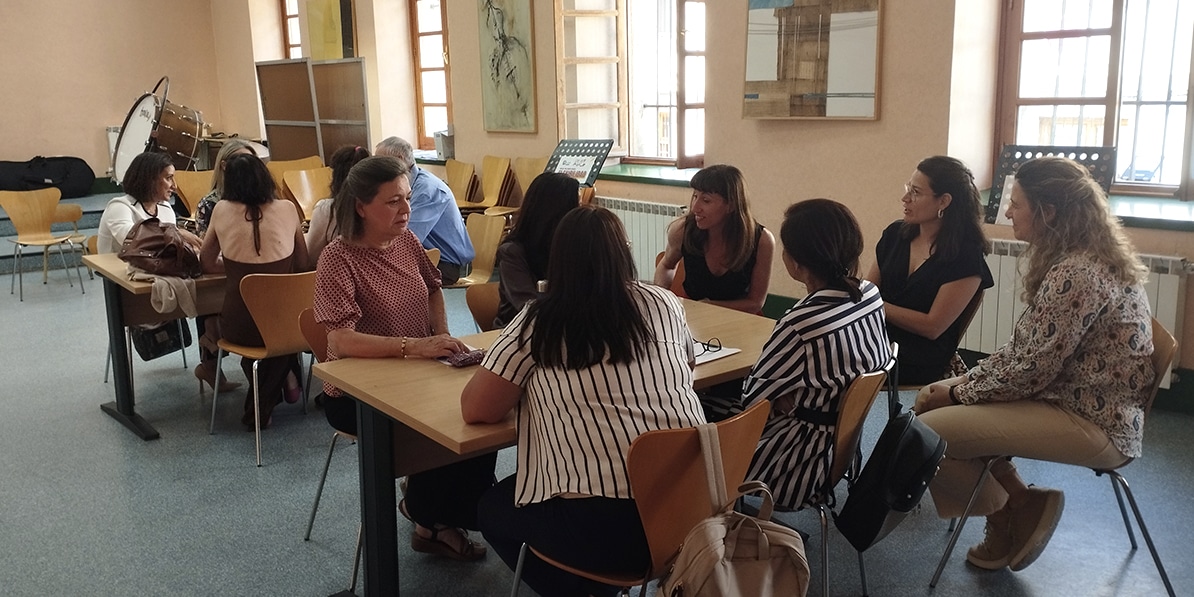Rural women believe in their future
Thanks to Entrena Empleo Rural, more than 500 rural women are preparing to find a job

ESF+
The first results of Entrena Empleo Rural, the project promoted by the Santa María la Real Foundation, which is financed by the European Social Fund Plus and Fundación MAPFRE, demonstrate that although rural women in Spain are interested in joining the workforce, the problem is that they have no real opportunities to do so. Currently, 534 women are enrolled in the program and have the opportunity to change their lives. Of these, 28 are already working and two are in training for skilled jobs.
The majority are women who have had limited schooling or are long-term unemployed, and almost all of them have devoted themselves to caring for their families. Their personal circumstances, pre-established gender roles, the lack of public transport connecting their homes to larger towns, where most of the job offers are located, and difficulties in accessing training are some of the reasons behind their limited professional development.
But something is changing. The women taking part in the program are willing to connect with themselves, with their potential, with their environment and with the world.
Because the keys to Entrena Empleo Rural are empowerment and connection. One of its most innovative tools is Speed Dating, a series of meetings where the women are put in contact with companies interested in incorporating certain professional profiles into their workforce. So far, four meetings have been held, in which 93 companies have been contacted either in person or online.
Each individual testimony from these women is the story of a collective accomplishment that does not distinguish between ages, origins or personal backgrounds. Fundación MAPFRE, as an ESF+ Intermediate Body, closely monitors the progress of this program. The following examples are an inspiration for many other women who wish to take control of their lives.
Belén, from Almansa (Albacete), is 50 years old and had been unemployed for a year and a half. After a long period caring for her mother, when she wanted to return to the workplace she encountered a number of difficulties. For her, one of the highlights of her time in the program was learning to explain that while she was working as a caregiver she grew as a person, reinforcing and acquiring skills that can be applied in the professional sphere. This has given her greater confidence in interviews and a different way of assessing her career. She sums it up like this: “Thanks to my role as a carer, I have taken on responsibilities and acquired skills including adaptability and empathy.”
Inmaculada is 48 years old, lives in Olivenza (Badajoz) and left her job to take care of her daughters. Her participation in Entrena Empleo Rural has helped her to regain confidence in her professional abilities and to stop feeling that the time she spent caring for her daughters has excluded her from the work force: “Now I feel more educated, with fewer burdens and more eager to return to the labor market. After taking part in the program, above all, I feel more confident and have greater self-esteem.”
Sonia is from San Martin de Valdeiglesias (Madrid). With experience as a receptionist and kitchen assistant, thanks to this program she has found work. “I was totally obsolete, I hadn’t had an interview for more than 17 years. Entrena Empleo Rural has helped me find my current job, thanks to the follow-up and support that my tutor has given me, especially in describing all my skills and knowledge in a friendly, yet professional way.”
Alicia, 51, also lives in San Martin de Valdeiglesias. Although she is a home-help assistant, she has always been dedicated to taking care of her father and siblings. Today, her life is different. She has found a job in home help and is taking a socio-health assistant course to get a permanent contract. “I am eternally grateful for how things are going for me.”
Entrena Empleo Rural is a project by women for women. The participants, technicians and coordinators of Fundación Santa María la Real are the leading lights in a transformation that extends from the rural to the global, opening up opportunities where there seemed to be none.




